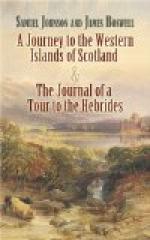There was no danger while we were there, and we found several other vessels at anchor; so that the port had a very commercial appearance.
The young Laird of Col, who had determined not to let us lose his company, while there was any difficulty remaining, came over with us. His influence soon appeared; for he procured us horses, and conducted us to the house of Doctor Maclean, where we found very kind entertainment, and very pleasing conversation. Miss Maclean, who was born, and had been bred at Glasgow, having removed with her father to Mull, added to other qualifications, a great knowledge of the Earse language, which she had not learned in her childhood, but gained by study, and was the only interpreter of Earse poetry that I could ever find.
The Isle of Mull is perhaps in extent the third of the Hebrides. It is not broken by waters, nor shot into promontories, but is a solid and compact mass, of breadth nearly equal to its length. Of the dimensions of the larger Islands, there is no knowledge approaching to exactness. I am willing to estimate it as containing about three hundred square miles.
Mull had suffered like Sky by the black winter of seventy-one, in which, contrary to all experience, a continued frost detained the snow eight weeks upon the ground. Against a calamity never known, no provision had been made, and the people could only pine in helpless misery. One tenant was mentioned, whose cattle perished to the value of three hundred pounds; a loss which probably more than the life of man is necessary to repair. In countries like these, the descriptions of famine become intelligible. Where by vigorous and artful cultivation of a soil naturally fertile, there is commonly a superfluous growth both of grain and grass; where the fields are crowded with cattle; and where every hand is able to attract wealth from a distance, by making something that promotes ease, or gratifies vanity, a dear year produces only a comparative want, which is rather seen than felt, and which terminates commonly in no worse effect, than that of condemning the lower orders of the community to sacrifice a little luxury to convenience, or at most a little convenience to necessity.
But where the climate is unkind, and the ground penurious, so that the most fruitful years will produce only enough to maintain themselves; where life unimproved, and unadorned, fades into something little more than naked existence, and every one is busy for himself, without any arts by which the pleasure of others may be increased; if to the daily burden of distress any additional weight be added, nothing remains but to despair and die. In Mull the disappointment of a harvest, or a murrain among the cattle, cuts off the regular provision; and they who have no manufactures can purchase no part of the superfluities of other countries. The consequence of a bad season is here not scarcity, but emptiness; and they whose plenty, was barely a supply of natural and present need, when that slender stock fails, must perish with hunger.




